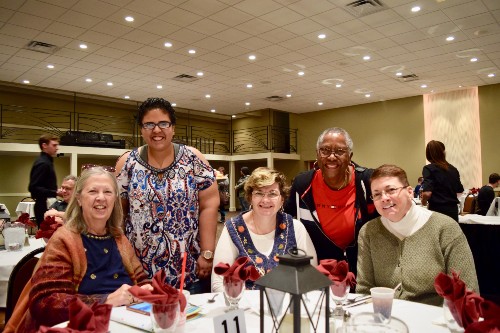The InVisionary
If any good has possibly come out of the 2020 coronavirus pandemic, it has shown us which parts of our daily lives are truly essential, and what needs more focus in future waves of the virus. The recently published survey results of the 2020 Direct Support Workforce and COVID-19 National Survey, conducted jointly by the University of Minnesota’s Institute on Community Integration and the National Association of Direct Support Professionals, not only show statistical answers that may feel obvious but also indicate problems for essential workers that need to be addressed.
The direct support workforce is the engine behind InVision’s staff of direct support professionals (DSPs), who provide the variety of critical tasks which ensure people with disabilities can thrive and work in their own spaces. These tasks range from teachers to chauffeurs to nurses, and everything in between. These are essential, daily jobs that continued during the most tiring, uncertain parts of the pandemic. As positions frequently classified as personal caretakers or home aides, they receive lower wages, limited benefits, and little respect from outside communities. COVID-19 has proved the lack of sincere effort in helping these communities be the best they can be.

Nearly 9,000 DSPs—defined as employees who spend at least 50% of the work week with those with intellectual or developmental disabilities (IDDs)—in the United States were surveyed in April and May of 2020. By that time, global quarantining was well underway and essential workers were at the forefront of the virus. Almost 60% of the survey responders held such essential worker positions within the IDD community as their full-time job and income source. Although 98% of the responders self-identified as essential workers, not all states directly counted them as essential when the pandemic began.
Well over half of the surveys agreed that the income these workers received was the primary income source for their household; however, only 34% reported an increase in pay as their hours and safety training increased. Breaking down the pay increase totals, 45% of DSPs received a $1-2 raise, while 19% received one dollar or less. A similar percentage earned $2-3 extra in their paychecks. Yet large percentages of DSPs reported that a specific aspect of their job, such as shift time, total hours worked, and new protocols had changed in a way that made adapting difficult.
As new safety decisions are implemented by the Centers for Disease Control and Prevention (CDC) and states shift phases of reopening, employers must actively work to adjust new measures and trainings for DSPs, especially those who work directly in the homes or personal spaces of people with disabilities. Most DSPs reported new requirements of wearing personal protective equipment (PPE) like masks and gloves (to varying degrees) when on the job. Many reported they either had to buy their own PPE or use alternatives when supplies ran low.
While it is hard to imagine the frustrations around these job shifts and how they compare to a pre-pandemic world, it is more difficult for the people with disabilities whose lives and care changed dramatically.
Although DPSs have succeeded in following safety protocols during COVID, the effects on people with disabilities have spiraled. Most respondents reported increased mood swings, boredom, and increased behavioral issues from the people they support. Further, many are unable to see their loved ones and have experienced losing their trusted care worker to COVID-related problems. These issues are expected to either remain stagnant or develop more intensely as reopening expands across the country.
The answers to these issues feel simple, but the action of developing them is slow. Increased safety training (and the compensation for it); proper pandemic response plans; professional recognition; education and strategies for people with disabilities; and policy reviews for family-centered practices are just a few of the areas where positive change is needed as we move forward. Although unprecedented times feel normalized, they are not forever. As we move through COVID together, we need to continue tackling these problems to make the DSP and ID/A community a beneficial one for all.
The direct support workforce is the engine behind InVision’s staff of direct support professionals (DSPs), who provide the variety of critical tasks which ensure people with disabilities can thrive and work in their own spaces. These tasks range from teachers to chauffeurs to nurses, and everything in between. These are essential, daily jobs that continued during the most tiring, uncertain parts of the pandemic. As positions frequently classified as personal caretakers or home aides, they receive lower wages, limited benefits, and little respect from outside communities. COVID-19 has proved the lack of sincere effort in helping these communities be the best they can be.

Nearly 9,000 DSPs—defined as employees who spend at least 50% of the work week with those with intellectual or developmental disabilities (IDDs)—in the United States were surveyed in April and May of 2020. By that time, global quarantining was well underway and essential workers were at the forefront of the virus. Almost 60% of the survey responders held such essential worker positions within the IDD community as their full-time job and income source. Although 98% of the responders self-identified as essential workers, not all states directly counted them as essential when the pandemic began.
Well over half of the surveys agreed that the income these workers received was the primary income source for their household; however, only 34% reported an increase in pay as their hours and safety training increased. Breaking down the pay increase totals, 45% of DSPs received a $1-2 raise, while 19% received one dollar or less. A similar percentage earned $2-3 extra in their paychecks. Yet large percentages of DSPs reported that a specific aspect of their job, such as shift time, total hours worked, and new protocols had changed in a way that made adapting difficult.
As new safety decisions are implemented by the Centers for Disease Control and Prevention (CDC) and states shift phases of reopening, employers must actively work to adjust new measures and trainings for DSPs, especially those who work directly in the homes or personal spaces of people with disabilities. Most DSPs reported new requirements of wearing personal protective equipment (PPE) like masks and gloves (to varying degrees) when on the job. Many reported they either had to buy their own PPE or use alternatives when supplies ran low.
While it is hard to imagine the frustrations around these job shifts and how they compare to a pre-pandemic world, it is more difficult for the people with disabilities whose lives and care changed dramatically.
Although DPSs have succeeded in following safety protocols during COVID, the effects on people with disabilities have spiraled. Most respondents reported increased mood swings, boredom, and increased behavioral issues from the people they support. Further, many are unable to see their loved ones and have experienced losing their trusted care worker to COVID-related problems. These issues are expected to either remain stagnant or develop more intensely as reopening expands across the country.
The answers to these issues feel simple, but the action of developing them is slow. Increased safety training (and the compensation for it); proper pandemic response plans; professional recognition; education and strategies for people with disabilities; and policy reviews for family-centered practices are just a few of the areas where positive change is needed as we move forward. Although unprecedented times feel normalized, they are not forever. As we move through COVID together, we need to continue tackling these problems to make the DSP and ID/A community a beneficial one for all.
Banner courtesy of the National Alliance for Direct Support Professionals.
Image courtesy of the National Alliance for Direct Support Professionals.




Comments (0)